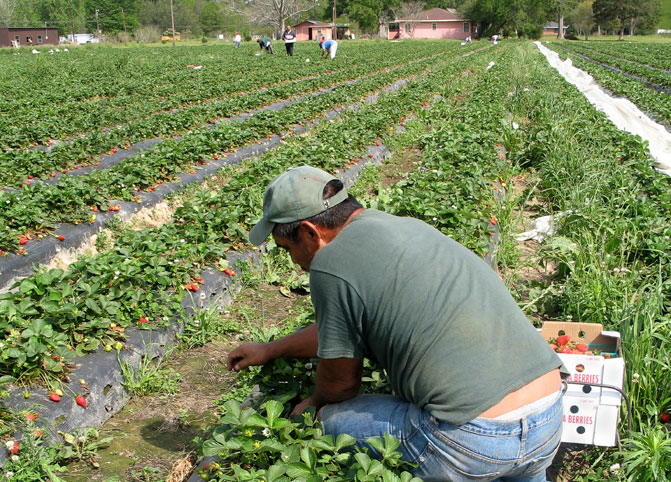Rose O’Donovan, editor of the excellent Agra-Facts, has interviewed Paolo De Castro, CAP reform veteran and currently holding a key role as Chairman of the European Parliament’s agriculture committee. Worth a watch.
… Read the rest
London Olympics opening ceremony chimes with greening vision for the CAP
The dazzling opening ceremony of the 2008 Beijing Olympics was a triumph of discipline, choreography, stagecraft. London will host the games later this summer and it was announced today that the 2012 opening ceremony will take an altogether different, gentler approach. The 2012 Olympics will open with a pastoral representation of the countryside comprising a mixed farm with over a hundred real live farm animals, a flower meadow, rivers, streams, cricket and thatched cottages. In short, the British countryside as it was before intensive agriculture and the common agricultural policy came along.
The organisers of the London Olympics seem very much in line with the European Commission’s thinking on the future of the CAP: agricultural intensification has gone too far, we need to start repairing the damage done to the countryside.… Read the rest
Cross compliance for labour laws?
The Global Mail reports on a shocking case of alleged abuses of migrant workers in the Spanish horticulture industry, concentrated in the southern Spanish region of Almería along a 200km strip of hothouses known as el mar de plásticos. This is where much of Europe’s salad vegetable crop is grown.
Allegations range from payment below the minimum wage, employment of illegal migrants, intimidation and, in the most recent case, murder. The UK’s Guardian newspaper’s special correspondent Felicity Lawrence wrote a startling report into labour abuses in €2 billion a year hothouse industry. She found:
… Read the restMigrant workers from Africa living in shacks made of old boxes and plastic sheeting, without sanitation or access to drinking water.
EFAs v. Set-Aside
Earlier this week, at the European Parliament, I moderated a seminar on the Commission’s proposal for ‘greening’ measures for the direct payments of the CAP, with a particular emphasis on the plans for ecological focus areas. The event was organised by the European Environmental Bureau and hosted by Austrian MEP Karin Kadenbach, who sits on the Parliament’s environment committee.
To qualify for the 30 per cent of the direct payments budget that the Commission has earmarked for ‘greening’ the CAP, farmers with grazing livestock will be required to preserve permanent grasslands, arable farmers will be required to cultivate a diversity of (three) crops and practice basic crop rotation.… Read the rest
Eurobarometer on CAP reform
A new Eurobarometer public opinion poll shows widespread support among European citizens for the Commission’s main CAP reform proposals. The poll, conducted by TNS Opinion and Social, interviewed 26,713 adults, enough for a representative sample in each member state.
The first question, concerning setting a cap on the amount of aid to the largest farms found that 47% of respondents favour a limit while 28% opposed a limit. 15 per cent didn’t know. Support for capping was strongest in Cyprus (+54%), Denmark (+36%), Finland (+33%) and Sweden (29%). Malta was the only country where more people thought a limit was a bad thing (-20%).… Read the rest
The genius of French farmers
Ever wondered how French farmers (and farmers in general) fight the PR war necessary to keep those CAP subsidies flowing? Then take a look at this, from yesterday’s stage of the Tour de France, the world’s biggest and most prestigious professional bicycle race.
Haskins sets out vision for CAP reform
It’s customary that on the eve of a reform of the Common Agricultural Policy, Chris Haskins (Baron Haskins of Skidby, an appointed member of the House of Lords) sets out his case for radical change.
In the 2011 edition, Haskins argues for a cut in the CAP budget and a redistribution from farmers in western Europe to farmers in the east. With an outlook of increasing commodity prices, the CAP should focus less on subsidising farmers and more on providing help declining rural areas, particularly in eastern Europe, following the model of EU structural and cohesion policy.
A former Chairman of Northern Foods, one of the UK’s biggest processed food companies, Haskins joins the growing chorus of those rejecting the notion that preserving the CAP is necessary for European food security:
… Read the rest“The main economic justification for an EU common agricultural policy is that, consistent with the rules of the single market, it offers all EU citizens secure and adequate supplies of affordable food.
Sustainable intenstification
 It’s the new buzzword in agriculture, confirmed by proceedings at the 2011 annual conference of the UK’s National Farmers Union, where delegates were often found to be talking about ‘how to get more from less’.
It’s the new buzzword in agriculture, confirmed by proceedings at the 2011 annual conference of the UK’s National Farmers Union, where delegates were often found to be talking about ‘how to get more from less’.
The term ‘sustainable intensification’ began to gain real currency following a report by the UK’s Royal Society, Reaping the benefits: Science and the sustainable intensification of global agriculture. The thrust of the argument is that the old ways of increasing global food production – bring more land under the plough and adopt the high input, high output technologies of the green revolution – will not work in the 21st century.… Read the rest
Heads you win, tails I lose
 Wyn Grant, Professor at Warwick University and an expert on the CAP, blogs on the subject over at commonagpolicy.blogspot.com. In a blog post this week on ‘The subsidies dilemma’, he notes:
Wyn Grant, Professor at Warwick University and an expert on the CAP, blogs on the subject over at commonagpolicy.blogspot.com. In a blog post this week on ‘The subsidies dilemma’, he notes:
… Read the restI was recently talking to a journalist from an esteemed weekly who has written on the CAP. He commented that when prices were low, the French (as the main defenders of the CAP) said that subsidies were needed to boost farm incomes. When prices were high or volatile, they were needed to ensure food security. He once asked a French minister if there were then any conceivable market circumstances in which an argument could not be produced in favour of subsidies.
Doha round agreement would leave EU farm subsidies untouched
According to the EU’s recent notification of farm subsidies to the WTO for the marketing year 2007/08, the EU’s trade distorting farm subsidies fell to a record low of 12.3 billion euros.
As the ICTSD reports,
… Read the rest“For the first time ever, the recent figures would put the EU’s overall trade-distorting support below the proposed new ceiling of 22 billion euros that would be established by a Doha Round accord under the terms currently being considered at the WTO. The Doha deal would create a new subsidy cap that limits the total amount of amber, blue and de minimis support that countries are allowed to provide.”


